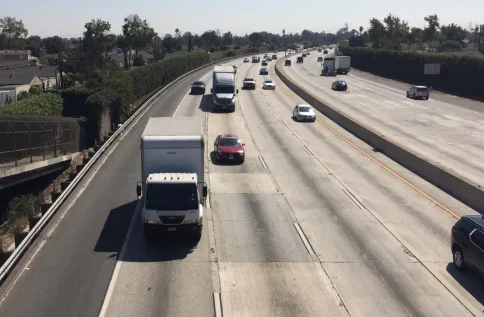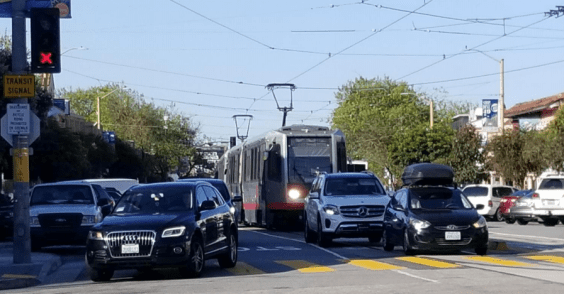Note: GJEL Accident Attorneys regularly sponsors coverage on Streetsblog San Francisco and Streetsblog California. Unless noted in the story, GJEL Accident Attorneys is not consulted for the content or editorial direction of the sponsored content.
To fight climate change and make California a more livable, sustainable place, the investments the state makes in its transportation system will have to shift away from simply expanding access for private cars. This point has been made numerous times by multiple state agencies. Studies commissioned by the legislature have shown why such a shift is absolutely necessary, even though it won't be easy.
One reason for this difficulty is a deep lack of transparency on the projects that are "in the pipeline," or somewhere in the planning stages between conception and construction. There are many factors contributing to this, including complicated funding cycles, multiple funding sources with different rules, silos separating partner agencies, different ways of defining project pieces, and the way that large projects are frequently broken up into smaller pieces to get them funded and built.
This has been becoming a bone of contention between advocates who want to engage with planners on whether projects fulfill needs or meet goals other than bigger-wider-faster car access and Caltrans and its partner agencies, who are not accustomed to being challenged on what makes a good transportation system.
Sustainable transportation advocates have filed public records requests, yielding a flood of disjointed and incomplete material. They have asked the California Transportation Commission and Caltrans for more details on the State Highway Operations and Protection Program (SHOPP) and the State Transportation Improvement Program (STIP), and have been met mostly with reasons why the information cannot be provided.
While California's transportation agencies, in the last few years, have gotten better at talking about sustainable transportation systems, there is no real way to judge whether it's just talk. Investment in sustainable transportation through programs like the Active Transportation Program and Affordable Housing and Sustainable Communities has increased, and Caltrans and other agencies have been committing to incorporating "complete streets" in their projects. But these investments are still dwarfed by ongoing investments in unsustainable, environmentally and socially problematic transportation.
A coalition of advocates sent a request to Governor Newsom asking for strong policies that support the Climate Action Plan for Transportation Investments (CAPTI), put out last summer by the California State Transportation Agency (CalSTA). That letter included detailed recommendations for responding to the legislature's A.B. 285 reports by identifying transportation investments that work against state climate, equity, and public health goals. One of their requests was to find a way to increase funding for transit operations; another was to direct the California Transportation Commission to better track funding that affects vehicle miles traveled.
Now some of those same advocacy groups have sent a letter to Caltrans asking for that information. The letter begins by acknowledging the progress Caltrans has begun to make, specifically in its action to end the planned widening of the 710 freeway in Los Angeles:
On May 26, the Los Angeles Metro Board of Directors voted unanimously to end the effort to widen the 710 freeway and reorient the $750 million in local sales taxes already dedicated to the project toward more just and equitable alternatives. The decision to stop the proposed expansion of the 710 freeway marks an important and symbolic turning point in California’s approach to transportation and mobility, opening up an opportunity to develop the 710 corridor in a way that meets all of our needs, from community mobility to the logistics industry to air quality and climate protection. Caltrans played a key role in this turning point when it recognized that the expansion it had long supported was not consistent with the imperatives of reducing air pollution, preventing climate change, and equitably serving community needs.
Our organizations thank you for that decision, and we urge you now to re-evaluate other projects that, like the 710 widening, have been in the pipeline for many years and may not serve California’s needs for the present and future. Projects have long life cycles, and many projects are still in the pipeline for funding even though they are not consistent with state climate, equity, and public health goals. Yet every year, worthy projects that do benefit the environment and equity - such as active transportation projects and transit - go unfunded.
The letter, signed by eighteen groups - among them the Coalition for Clean Air, Streets for All, Climate Plan, California Walks, the Natural Resources Defense Council, The Greenlining Institute, the Institute for Transportation and Development Policy, the Safe Routes Partnership, and Act LA - seeks "a transparent public process that listens to community voices."
Long-term, that would mean a publicly accessible statewide database, but in the short term, they ask Caltrans for a list of any projects in its planning pipeline that would increase vehicle miles traveled. They are asking for information that should be available in its SHOPP and STIP investment planning documents, but is not easy to find, including project costs, funding sources, changes in design or scope, and whether the project is located in a disadvantaged community.
"We are also requesting any evaluation Caltrans and/or the appropriate [regional transportation planning agency] has done of the projects, including how they advance safety, health, equity, and CAPTI principles, and would like to hear how you plan to involve communities in decision-making on the future of these legacy projects."
Reevaluating projects that are "in the pipeline" is a key step in getting California to invest its transportation money wisely, for the long term, in ways that support healthy communities.
They cannot be reevaluated if no one knows what they are.
Caltrans responds that it "has received the letter and looks forward to working with these organizations toward our shared goals of building and maintaining a travel network that serves all users and respects the environment."





